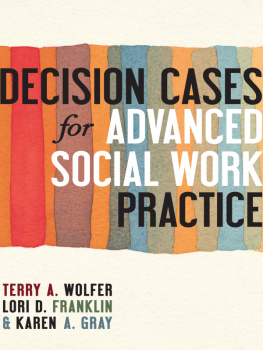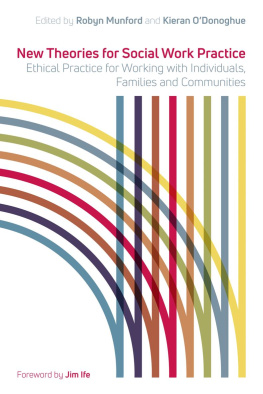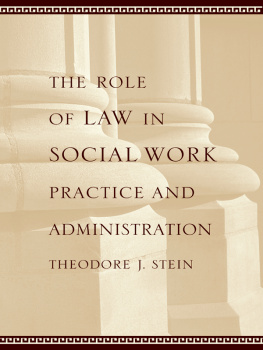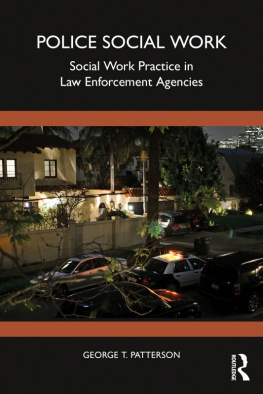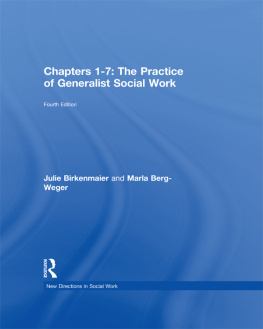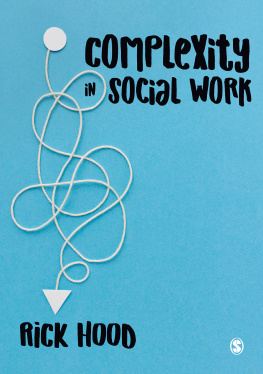Decision Cases for Advanced Social Work Practice
DECISION CASES FOR
ADVANCED SOCIAL WORK PRACTICE
Confronting Complexity
Terry A. Wolfer,
Lori D. Franklin,
and
Karen A. Gray
COLUMBIA UNIVERSITY PRESS
NEW YORK
Columbia University Press
Publishers Since 1893
New York Chichester, West Sussex
cup.columbia.edu
Copyright 2014 Columbia University Press
All rights reserved
E-ISBN 978-0-231-53648-6
Library of Congress Cataloging-in-Publication Data
Decision cases for advanced social work practice : confronting complexity [edited by] Terry A. Wolfer, Lori D. Franklin, and Karen A. Gray.
pages cm
Includes bibliographical references and index.
ISBN 978-0-231-15984-5 (cloth : alk. paper) ISBN 978-0-231-15985-2 (pbk. : alk. paper) ISBN 978-0-231-53648-6 (ebook)
1. Social case workUnited StatesCase studies. 2. Social work educationUnited StatesCase studies. 3. Social serviceUnited StatesCase studies. 4. Social workersTraining ofUnited StatesCase studies. I. Wolfer, Terry A. II. Franklin, Lori D. III. Gray, Karen A.
HV43.D46 2013
361.320973dc23
2013027815
A Columbia University Press E-book.
CUP would be pleased to hear about your reading experience with this e-book at .
COVER DESIGN: Jordan Wannemacher
References to websites (URLs) were accurate at the time of writing. Neither the author nor Columbia University Press is responsible for URLs that may have expired or changed since the manuscript was prepared.
TERRY A. WOLFER
In honor of my case method mentor,
Michael F. Welsh
LORI D. FRANKLIN
In honor of my parents,
Gary N. Franklin and Nancy Baker Franklin
KAREN A. GRAY
In memory of my beloved parents,
Lillian Ruth Hemenway Gray and James Jerome Gray
CONTENTS
This project began in 2009 when Karen Gray invited Terry Wolfer to the University of Oklahoma to share his knowledge about case writing and teaching. Karen had worked with Terry on cases previously and invited him to Oklahoma to mentor faculty in case writing. He met with the instructors of Oklahomas integrative seminar course, which uses the case method of teaching, and Lori Franklin soon joined their writing collaborative. Together, we decided to compile a collection of cases from multiple areas of practice for instructors to utilize in capstone courses, integrative seminars, and elsewhere across the curriculum.
Lori subsequently received a Faculty Enrichment Grant from the University of Oklahoma, which supported travel and supplies for interviewing practitioners for cases. In addition to this financial support from the University of Oklahoma, we also received support from faculty members at the University of Texas at Austin. Texas faculty members Nol Busch-Armendariz and Dawnovise Fowler were a part of the Oklahoma workshop and have contributed a case. Nol later invited us to Texas for an additional case-writing workshop in 2011. In these and other ways, the Universities of South Carolina, Oklahoma, and Texas have supported this case-writing project.
The cases in this collection are based on field research with professional social workers. Although these workers must remain anonymous, we are deeply grateful for their time and effort in giving interviews and reviewing case drafts and for their openness with us throughout the writing process. The interviews required that they recall and reflect upon situations they often found personally challenging, even disturbing. They were not always proud of or pleased with their responses in the situations reported but nevertheless persisted in sharing their experiences for the benefit of students. Without endorsing all their perceptions or responses, we consistently found these social workers to be caring, competent, and ethical practitioners. If they were otherwise, their cases would be less compelling. The case collection would obviously not be possible without these professionals and their deeply personal contributions.
We found most cases by asking experienced social workers about memorable dilemmas they had experienced in professional practice. In a few instances, professionals familiar with decision cases volunteered to report cases when they learned about the project. We sought cases from a variety of professional settings because we wished to provide a curriculum resource broadly applicable to social work education. For the same reason, we sought cases portraying a variety of intervention levels, including direct practice with individuals, families, or groups and practice supervision. As a result, particular cases can be used across the social work direct-practice curriculum.
We researched and wrote the cases using a highly collaborative process developed by a friend and colleague, Mike Welsh. It involved small case-writing teams led by the authors. Teams typically met for initial reporting sessions lasting 90 to 120 minutes. The case-writing process consisted of five steps. First, the case reporter prepared a brief written account of a problem or dilemma he or she actually faced in social work practice. Second, during the initial reporting session, the case reporter told the story in detail. Other team members asked questions to elicit information about the situation on multiple levels (e.g., intrapersonal dynamics, interpersonal and social relations, organizational factors, policy issues). These reporting sessions were audio recorded to collect detailed descriptions and verbatim dialogue. Third, immediately after the initial reporting session, a case writer prepared a working draft of the case that included a title, introductory hook, basic narrative, and a dilemma-posing ending. Fourth, at a subsequent team meeting or via email, the case writer distributed the working draft to other members of the team. At this point, the team members asked further questions of the case reporter to correct, clarify, or amplify the case. Fifth, the case writer used the additional information that emerged from this discussion to revise the case. In addition, analysis from the follow-up discussion was used to prepare teaching notes for the completed case. This writing process promoted in-depth collaboration with experienced practitioners from a variety of social service settings.
The cases are carefully disguised to protect the confidentiality of the case reporters, clients, the case reporters coworkers, and the organizations in which the cases occurred. For example, cases may be placed in other states and in organizations with fictitious names, and, of course, all names have been changed. However, in order to maintain the integrity of the cases and portray the issues and dynamics as accurately as possible, we tried to retain details such as peoples ethnicity, gender, socioeconomic status, personal histories, and other characteristics that affected their interactionskeeping these details either unchanged or very close to the actual situation. Similarly, we tried to retain organizational and community characteristics.
Because some of the cases were coauthored, a bit of explanation about this process is in order. Some of the coauthors were our students or former students, and several were faculty colleagues. For everyone, Terry provided formal instruction or at least written guidelines and informal guidance for writing decision cases and teaching notes. More than other forms of academic writing, decision cases require an unusual combination of technical expertise and familiarity with practice settings. Details matter. Sometimes, for example, a decision turns on a seemingly minor fact, a matter of timing, or an overlooked policy. For that reason, it was important to collaborate with practitioners in this project.

